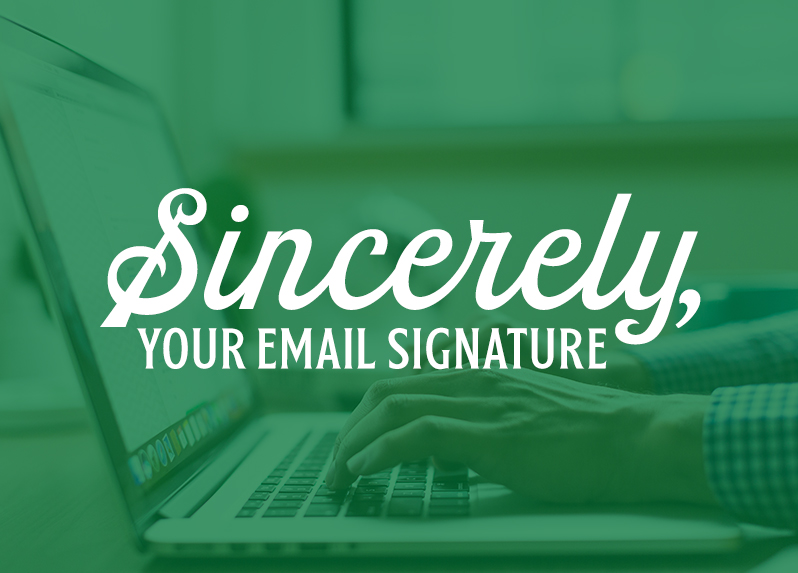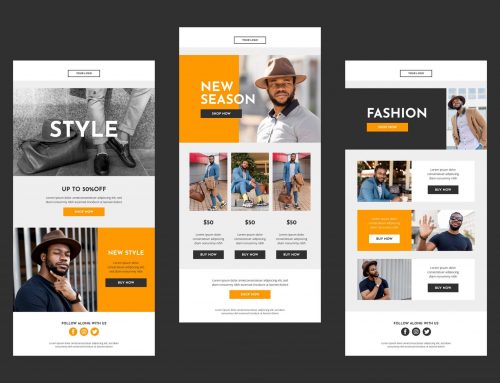SINCERELY, YOUR EMAIL SIGNATURE
If there’s one thing you shouldn’t be doing in your emails, it’s re-typing your name/contact info at the end of every message. Many corporations already have templates for their employees and have their IT department create a signature for them. However, if you’re an entrepreneur, student, or small business owner, you might be feeling a little lost as to where to begin. That’s what we’re here for! Here’s what to consider when creating an email signature:
THINGS TO INCLUDE:
Just as if you’re writing a letter, you’ll definitely need the following items to get started:
- Your Name
- Your Title / Department
- Company Name
OTHER ITEMS TO CONSIDER:
Phone Number
Add your phone number to your signature. This is typically the best way for people to reach you (besides email). If you have more than one phone number (i.e. a number with an extension, a personal/cell number, etc.) consider providing both. If you don’t prefer to be contacted at your personal number, do not include it in your signature.
Logo
Including your logo adds a professional, legitimate feel to your signature. It verifies that you are who you say your are. If your logo is large and contains a lot of elements, consider using elements of you logo; for instance, if you have an icon next to your brand name, consider incorporating just the icon portion of the logo.
Photo
A new trend in the email signatures is to include a photo of yourself. This adds a personal touch, and allows people to put a face to the person they’re speaking to digitally. The whole point of email is to connect with people digitally – some businesses never meet their clients in person, so putting a photo in your signature can almost simulate a face-to-face interaction.
NOTE: If you are trying to add an image or logo to your email signature via Gmail, any image you want to use must already be public and published online. Gmail only allows images attached to a URL to be included in a signature. So, make sure your photo/logo is available online! The best advice is to take logos/photos from your website.
Company URL
It is a good idea to incorporate the URL into an email signature. It will drive traffic to your site, and provide recipients with the option to learn more about your company.
Social Icons
If you need to increase your social media presence, or your business relies heavily on social media marketing, definitely include the icons in your email signature. If your business does not have a large social presence, do not waste the limited space you have in your signature. Many people have become used to searching for people on social platforms, so icons are not completely necessary.
Local Address
You will most likely want to include your local address. If you hold meetings at your place of business, or run a retail business that people would need to know your address, this is especially pertinent to include.
STYLE CONSIDERATIONS:
Horizontal Orientation
Limit the number of lines of text on an email signature. Placing one piece of information per line can make a signature very long. Since many email users view emails in mobile, the less stacked the signature, the less users have to scroll.
Simplicity is Key
Do not overdesign your signature. It should look natural and simple. Limit the signature to two colors, and consider brand colors when selecting font colors. For readability purposes, keep important information in a dark color (black, navy, or charcoal). Use accent colors for elements like your logo, info titles like “Phone:” or social media icons.
Consider fonts that are universally web-friendly. Limit the number of fonts as well. Try to use a font that has various weights (light, regular, bold, italic), and use those to highlight certain titles or information. A flexible typeface is always a smart consideration, even for purposes outside of an email signature. If you do feel as though you need to add another font into the mix, that is okay. However, more than 2 fonts can get distracting.
Alignment
Viewers process information easier when it is organized in a visually pleasing manner. Left-aligning the copy is the safest way to go about planning the hierarchy of the signature.
Hierarchy
Typically, email signatures start with the first and last name, and then the title/company. After that, the rest of the information depends on how you want your recipients to contact you. Is your phone number the best way to reach you? Is it more important for people to visit your website? It all depends on what makes the most sense for you and your business.
Dividers
Utilizing lines as dividers between information can break up your signature and create a sense of ease for viewers eyes. Piling all information into one long list can become overwhelming. Email signatures can be tricky, as you’re confined to a small space for your information. However, if you have room to break your information up, go for it.
Icons
Instead of writing out “Phone” or using “P” as an abbreviation, consider incorporating icons instead. The advantage of incorporating icons is that icons speak for themselves without taking up space writing out the full word. A telephone icon takes up much less space than the word “Phone”, while also eliminating the use of single letter abbreviations, but also still gets the message across. Incorporating icons into your signature is also a great idea when your company is international – icons are a universal language and may even be your safest bet when working with people around the globe.
Sizing
Mobile devices are generally 320 px wide at the smallest – though some phones are larger, it’s best to keep signatures 320 px wide to be safe. This is why it’s important to keep the content in your signature as simple as possible – a crammed signature can come across as unprofessional.
72 dpi is the standard resolution for images on the internet – this is the resolution any images in your signature should be set at to make sure everything is sharp, and not pixelated.
Images should also be limited to 50KB to ensure quick load times. The last thing you would want is your email signature to not automatically pop up or slow down a recipient’s email system.
At the end of the day, an email signature should not be optional in 2019. Email signatures make you look professional, and make you more approachable. For custom email signature design, contact us at ocreations! Let’s get professional, let’s get creative.







